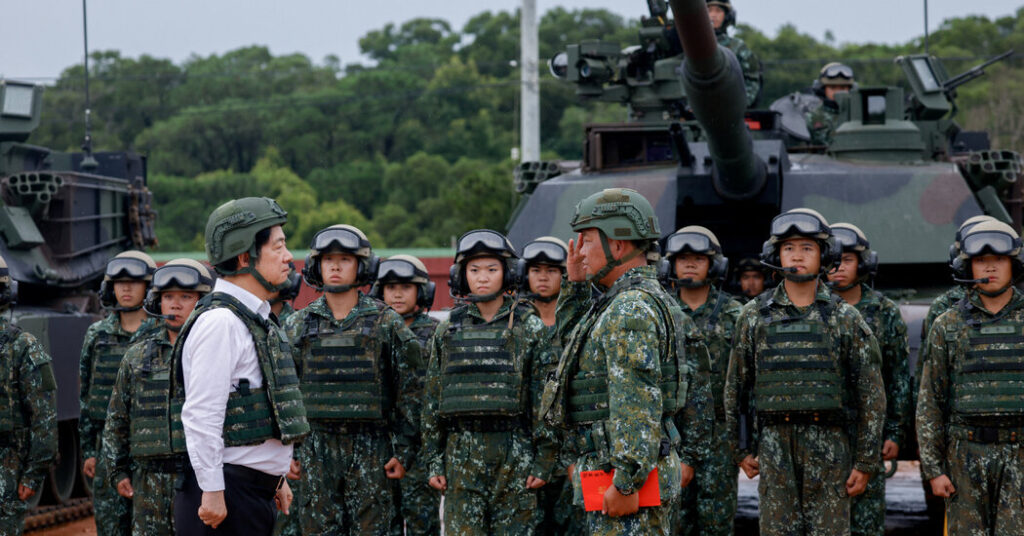President Lai Ching-te of Taiwan said his government would introduce a $40 billion special budget for military spending that will focus on acquiring more of the nimble, mobile weapons from the United States that it needs to deter and outsmart China’s far larger military forces.
The proposed spending, which would be in addition to the main annual military budget, is politically important for Mr. Lai’s government, which has come under pressure from the Trump administration to increase defense outlays. Beijing asserts that Taiwan is its territory, and says that it could use armed force to take the island if it deems necessary.
Mr. Lai announced his plan for the special budget in an opinion piece published in The Washington Post on Tuesday. He wrote that Taiwan planned to counter China’s threat by buying more “asymmetrical” weapons — that is, mobile missiles and other arms that may be able to evade and outmaneuver Chinese forces.
“In doing so, we aim to bolster deterrence by inserting greater costs and uncertainties into Beijing’s decision-making on the use of force,” Mr. Lai wrote. He also promised to speed up the creation of a multilayered system intended protect Taiwan from Chinese missiles, rockets, drones and aircraft.
He wrote: “Together with other A.I.-driven and unmanned platforms, these capabilities bring us closer to the vision of an unassailable Taiwan, safeguarded by innovation and technology.”
Mr. Lai’s proposal must be approved by Taiwan’s legislature, where it may be held up or blocked by opposition parties. Mr. Lai is scheduled to give a speech in Taipei on Wednesday in which he is expected to flesh out his proposal.
Mr. Lai’s government has also proposed increasing the regular defense budget for 2026. In total, the additional spending could take Taiwan’s military outlays to 3.3 percent of its economic output next year, Mr. Lai wrote. The Trump administration has pressed Taiwan to spend at least 5 percent of its gross domestic product on defense, up from its current level of about 2.45 percent. Mr. Lai wrote that he is committed to meeting the Trump administration’s target by 2030.
Mr. Lai’s announcement underscores the growing pressure on Taiwan by China, which has in recent days has sought to punish Japan for expressing support for Taiwan. China has mounted a ferocious campaign of denunciations and travel boycotts after Japan’s new prime minister, Sanae Takaichi, told Parliament that an effort by China to blockade or invade Taiwan could force Japan to deploy its military forces.
Previous Japanese prime ministers had avoided specifying how they would respond to a Chinese attack on Taiwan for fear of provoking a domestic political backlash, but Ms. Takaichi’s tough stance has so far been met with strong public approval.
Mr. Lai’s budget proposal faces potential obstacles in the legislature, where his Democratic Progressive Party is outnumbered by the main opposition party, called the Nationalist Party or Kuomintang, as well as a smaller group, the Taiwan People’s Party.
Opposition lawmakers recently raised criticisms of Taiwan’s military acquisitions, pointing out that orders for U.S. weapons including F-16 fighter jets have met with severe delays. They have also criticized a project by Mr. Lai’s administration to build a new fleet of submarines, calling it a waste of money.
The recently elected chairwoman of the Nationalist Party, Cheng Li-wun, has objected to sharply increasing Taiwan’s military spending. Ms. Cheng is not a member of the legislature, but her views could hold sway over some Nationalist lawmakers.
In an interview this week, Ms. Cheng said she agreed with “reasonable” levels of military outlays for Taiwan, but maintained that dialogue with Beijing was the way to ensure the island’s security against China’s much larger armed forces.
“I believe the priority lies in a political approach, not through substantial increases in military spending,” she said.
Chris Buckley, the chief China correspondent for The Times, reports on China and Taiwan from Taipei, focused on politics, social change and security and military issues.
The post Taiwan’s President to Seek an Extra $40 Billion for Military appeared first on New York Times.




